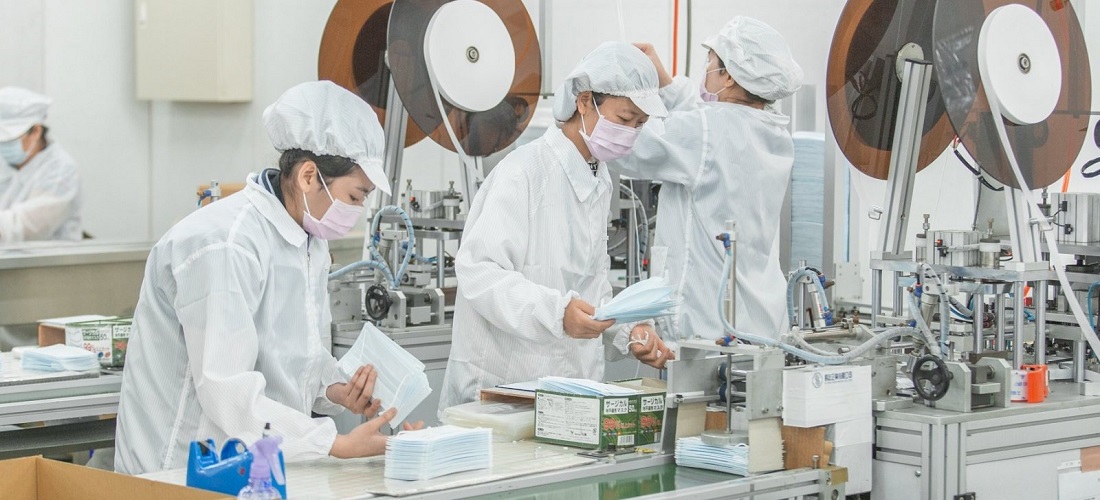
Imports and costs threaten mask production in Brazil
Feb, 22, 2022 Posted by Gabriel MalheirosWeek 202208
One of the sectors resuscitated with Covid-19, the Brazilian industry of personal protective equipment, which includes masks and medical clothes, has resumed shrinking rapidly, according to large suppliers of nonwovens, the material used in the manufacture of these products.
The influx of imported products, many of which do not fulfill Brazilian regulations, and the rising cost of polypropylene (PP), has resulted in the shutdown of many machines in the country, putting in check an industry that reinvented itself during the height of the pandemic, preventing many countries from suffering shortages of protective gear.
According to estimates, more than 50% of the surgical masks used in Brazil are currently imported.
“Demand increased significantly, which benefited the nonwovens businesses that invested in the country. Today, local manufacturers can meet 100% of the demand, demonstrating that when there is an investment, there is a market in Brazil,” says Berry’s vice president for Latin America, Luis Fernando Otero.
It is believed that imports, particularly from Asia, supply more than half of the Brazilian market for protective masks. According to the Brazilian Association of Nonwovens and Technical Fabrics Industries (Abint), roughly 2 billion surgical masks were imported in 2021, up 50% year-on-year, at an average FOB price of US$0.07 per unit.
Conversely, the approximately 150 local producers, who currently have an installed capacity of more than 500 million surgical masks and 75 million N95 masks per month, would be able to supply 100% of local demand. However, that does not have due to their high level of inactivity, given that the domestic product is more expensive than the imported ones.
The higher price of PP in the region compared to Asia and the maintenance of the so-called “covid list,” which exempts several inputs used to fight the pandemic from import tax, generated asymmetries that need to be corrected, say nonwovens producers.
“Temporary norms that turn permanent create problems,” says Berry’s Otero. According to the CEO, the multinational, which integrated the former Companhia Providência, generated approximately R$ 1.5 billion in the country in fiscal 2020 and intends to continue investing in the local operation, operating at total capacity. However, these disparities are concerning. “We’re hoping to hear positive news shortly.”
The principal raw material for nonwoven fabrics is polypropylene, which cost twice as much in the region at the end of 2021 as it did a year earlier due to the surge in oil costs. At one point, the resin used by Latin American companies was 70% more expensive than that used in Asia. According to the industry, this disparity is now between 25% and 35%.
“Everything is against local production at the moment,” says the president of Abint, Carlos Eduardo Benatto. According to estimates, national nonwovens output remained constant in 2021, at roughly 365 thousand tons, compared to the previous year. Apparent consumption, at 273 thousand tons in 2020, may have increased slightly with industries that had been severely impacted by the pandemic, such as automotive and footwear, resumed activities. Hygiene was the sector whose demand was least affected by the crisis (diapers and sanitary towels).
Aside from the less competitive raw material, the Brazilian industry must adhere to high technical standards, test its products, and demonstrate efficiency and safety. According to Benatto, the document required for admission into the country in the case of imports is a self-declaration by the maker attesting that the product fits the specifications.
Source: Valor Econômico
To read the full original article:
-
Ports and Terminals
May, 15, 2023
0
Port of Imbituba celebrates historic four-month period
-
Coffee
Jan, 26, 2023
0
China’s coffee consumption big enough to shake international trade
-
Oil and Gas
May, 13, 2019
0
Oil and gas union calls 24-hour strike at Vaca Muerta
-
Trade Regulations
May, 25, 2021
0
Government to access the impact on the Brazilian market of importing agricultural products


